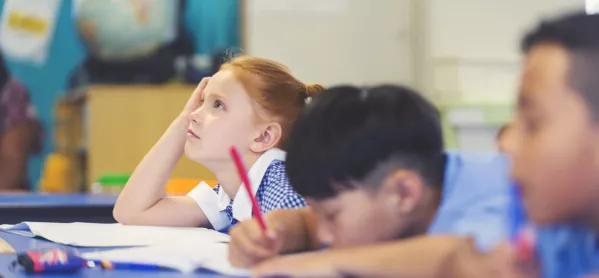- Home
- Exclusive: Growth mindset lessons had no impact
Exclusive: Growth mindset lessons had no impact

A major study of the use of growth mindset in schools in England has found that it made no difference to pupils’ English or maths results.
Growth mindset, a concept developed by Stanford professor Carol Dweck, is the idea that an individual’s learning can be improved if they believe that their intelligence can grow through hard work.
The theory has become popular in schools in England but is also controversial, with geneticist Robert Plomin claiming it is a “gimmick”.
Analysis: Will new study findings stop growth mindset?
Carol Dweck: Where growth mindset went wrong
Podcast: Professor Carol Dweck on growth mindset theory and her critics
Research: Professor Angela Duckworth on character education
Now, a study of 5,018 10- and 11-year-old pupils funded by the Education Endowment Foundation (EEF) has found that pupils who were taught after their teachers had been on the Changing Mindsets project, delivered by the University of Portsmouth, made no additional progress to those in a control group.
“The independent evaluators found that pupils who received the intervention didn’t make any more progress than those who did not,” said Sir Kevan Collins, chief executive of the EEF.
“It was also clear that most of the teachers taking part in the trial were already aware of growth mindset theory and its messages. What this tells us is that schools should be wary of using growth mindsets as a standalone way of boosting attainment.”
The Changing Mindsets project involved teachers attending a one-day training course on mindset theory and evidence - they were also given materials and training to run weekly lessons and activities on mindset theory with their pupils for around two hours a week over eight weeks.
These eight sessions covered themes such as the meaning of intelligence, dealing with mistakes and emotions and inspirational people. In addition, teachers aimed to embed the growth mindset approach in their everyday class activities.
Earlier EEF research had found some “promising results” from the project. But they have not been replicated by the larger trial.
The new evaluation, which was carried out by the National Institute of Economic and Social Research, found that pupils who had been part of the project did no better in the Sats tests in reading, spelling, punctuation and grammar (Spag) and maths at the end of Year 6 than those who were not part of the project.
The research comes after Professor Dweck admitted to Tes last week that she had not initially recognised the “complexity of the implementation” of growth mindset in classrooms.
The EEF’s previous smaller trial of Changing Mindsets, in 36 schools, found that teachers trained in the principles of growth mindset had zero impact on the pupils they taught subsequently.
However, when the ideas were embedded in practical workshops with pupils, children gained an extra two months’ progress compared with similar children not involved.
While this progress was not statistically significant, the results for English were close enough to statistical significance for the EEF to conclude that the approach showed promise.
Today’s report said that the lack of a measurable impact of the Changing Mindsets programme on pupils may be due to the widespread use of growth mindset theory - with most teachers in the comparison schools (that did not receive the intervention) familiar with it and more than a third having had training days on growth mindset.
The report pointed out that other studies of secondary pupils in the US and Norway, have found evidence that it is possible to shape pupil’s beliefs about their intelligence with long-term impact on their attainment.
And it added that age and maturity may be a factor for a lack of impact in this study - saying that older pupils may be more able to understand their own strengths and weaknesses, know when to seek help and how to process feedback, than 11-year-olds.
Professor Carol Dweck told Tes: “We welcome studies such as this, I have great respect for the researchers, and we hope to learn from them and their experiences.
“We have never (or at least not yet) conducted a mindset research programme aimed at teachers - four or five years ago we realised that there were large barriers to teacher implementation of mindset programs.
“We didn’t yet know how to give adults a deep understanding of mindset concepts, we didn’t yet know which practices were key to implementing a growth mindset in the classroom, and we didn’t yet know how to help adults integrate these practices into their teaching.
“We deeply believe that ultimately the full power of growth mindset will be seen only when we know how to create these cultures in the classroom.
“All of our studies to date have been directly aimed at students and we have a large study with a nationally representative sample of 9th grade [Year 10] students coming out in Nature next month.
“Our direct-to-students programmes have a meaningful effect on the grades of lower-achieving students.
“We know direct-to-students programmes that we have developed work and we are working to provide a teacher training programme that we will have tested, in the future. It is an on-going enterprise.”
Keep reading for just £1 per month
You've reached your limit of free articles this month. Subscribe for £1 per month for three months and get:
- Unlimited access to all Tes magazine content
- Exclusive subscriber-only stories
- Award-winning email newsletters



